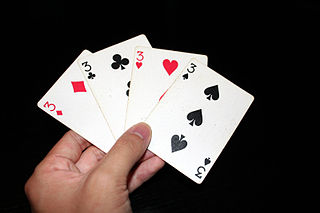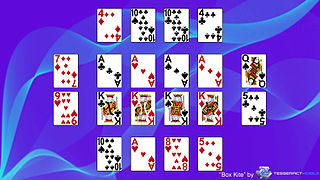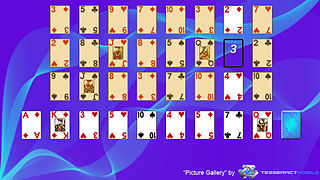Osmosis is a solitaire game played with a deck of 52 playing cards. The object, like many solitaire games, is to put the cards into foundations, although not in numerical order. The name of the game reflects the fact that cards of the same value slowly filter through to successive foundations by osmosis.

Napoleon at St Helena is a 2-deck patience or solitaire card game for one player. It is quite difficult to win, and luck-of-the-draw is a significant factor. The Emperor Napoleon often played patience during his final exile to the island of St Helena, and this is said to be the version he probably played. Along with its variants, it is one of the most popular two-deck patiences or solitaires. The winning chances have been estimated as 1 in 10 games, with success typically dependent on the player's ability to clear one or more columns. The game is the progenitor of a large family of similar games, mostly with variations designed to make it easier to get out.
Bisley is a patience or card solitaire which uses a deck of 52 playing cards, and while difficult, it often can be completed successfully. It is closely related to Baker's Dozen, but the foundations are built upwards from Ace and downwards from King simultaneously. It is one of the few one-deck games in which the player has options on which foundation a card can be placed.

Desmoche is a popular rummy card game usually played for small stakes which closely resembles other games in the rummy family, like Conquian and gin rummy, more than poker. It was probably devised in Nicaragua in the first half of the 20th century.
Matrimony is a patience or card solitaire game that uses two packs of 52 playing cards. It is a difficult game which depends mostly on luck and is sometimes mechanical.

Tiến lên is a shedding-type card game originating in southern China and Vietnam. It may be considered Vietnam's national card game, and is also played in the United States, sometimes under the names "Viet Cong", "VC", "Thirteen", or "Killer".
Big Ben is a patience or card solitaire which uses two decks of playing cards mixed together. It is named after Big Ben, the nickname of the clock tower of the Palace of Westminster in London.

Queen's Audience, sometimes known as King's Audience, is a pictorial patience or solitaire card game which uses a single pack of 52 playing cards. It is so named because the Jacks and their 'entourage' end up adjacent to their respective Queens as if having an audience with them.
Archway is a patience or solitaire card game using two decks of 52 playing cards. Its goal is to bring all 104 cards into the foundation. It was invented by David Parlett, and is based on an old French solitaire game called La Chatelaine.

La Belle Lucie is a patience or card solitaire where the object is to build the cards into the foundations. It is considered to be representative of the "fan" family of solitaire card games, and has a pleasing layout.
Algerian or Algerian Patience is a unique and difficult patience or card solitaire using two decks of playing cards. The object of the game is to build 8 foundations down from King to Ace or up from Ace to King in suit.
Aces and Kings is a challenging and original solitaire game using two decks of playing cards, and was created by Thomas Warfield. The object of the game is to build 8 foundations down from King to Ace or up from Ace to King without regard to suit.
American Toad is a patience or card solitaire game played using two standard packs of playing cards. It is similar to Canfield except that the tableau builds down in suit, and a partial tableau stack cannot be moved, only the top card or entire stack. The object is to move all cards to the foundations.
Batsford is a patience or card solitaire similar to Klondike except that it uses two decks instead of one. The cards are turned up one at a time during a single pass through the deck, and there is also a reserve pile available for a single King.
Beetle is a difficult patience or solitaire card game using two decks of playing cards. The game is similar to Spider, except the Tableau cards are faced up. The object of the game is to group all of the cards into sets of 13 in suit.

Box Kite is a moderately difficult patience or card solitaire using two packs. The object of the game is to move all of the cards to the foundations. It is a variant of the old game of St. Helena.
Corona is a relatively long and difficult patience or card solitaire using two decks. The object of the game is to move all of the cards to the foundations. Successfully winning the game is considered difficult.

Josephine is a patience or solitaire card game using two decks of playing cards. The object of the game is to move all of the cards to the Foundations. It is a variant of the more commonly known Napoleon at St Helena, and is named after Josephine de Beauharnais, Napoleon's first wife.

Royal Parade is an old, English, two-pack patience of the half-open builder type. The object of the game is to move cards to the foundations to create a 'gallery' full of picture cards.

Australian Patience is a patience or card solitaire using one deck of playing cards. This game is a challenging combination of Klondike and Scorpion, and is also closely related to Yukon. The object of the game is to move all of the cards to the Foundations.










